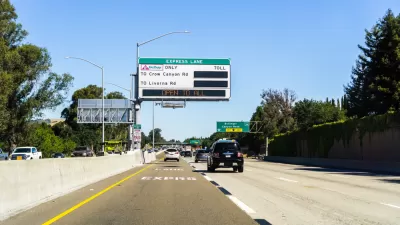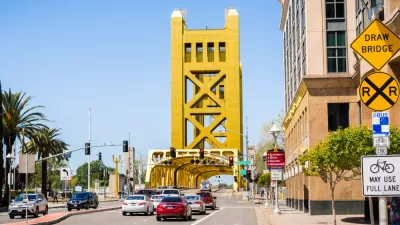Emily Badger recounts the litany of gripes about Big Box stores, then proceeds to present the results of a recent study that shows why they may not be so bad after all.
Using the specific example of a Target store that opened in the progressive community of Davis, California in 2009, Badger discusses the potential benefits of in-town Big Box stores. A study produced by the UC Davis's Institute of Transportation Studies demonstrated that the Target reduced monthly vehicle miles traveled for shoppers without reducing the frequency of shopping trips to downtown Davis.
As it turns out, at least from this example, according to researcher Kristin Lovejoy, "the majority of people shopped at these stores already." So, "this turns out be an example of bringing shopping closer to where people live."
Badger introduces a key caveat however: "Of course, reduced driving is just one policy goal, and the benefit may not be worth it if it comes at the expense of dying mom-and-pop shops (or other social costs). In Davis, though, that's not exactly what happened."
FULL STORY: Why In-Town Big Box Stores Might Not Be As Awful As You Think

Maui's Vacation Rental Debate Turns Ugly
Verbal attacks, misinformation campaigns and fistfights plague a high-stakes debate to convert thousands of vacation rentals into long-term housing.

Planetizen Federal Action Tracker
A weekly monitor of how Trump’s orders and actions are impacting planners and planning in America.

In Urban Planning, AI Prompting Could be the New Design Thinking
Creativity has long been key to great urban design. What if we see AI as our new creative partner?

King County Supportive Housing Program Offers Hope for Unhoused Residents
The county is taking a ‘Housing First’ approach that prioritizes getting people into housing, then offering wraparound supportive services.

Researchers Use AI to Get Clearer Picture of US Housing
Analysts are using artificial intelligence to supercharge their research by allowing them to comb through data faster. Though these AI tools can be error prone, they save time and housing researchers are optimistic about the future.

Making Shared Micromobility More Inclusive
Cities and shared mobility system operators can do more to include people with disabilities in planning and operations, per a new report.
Urban Design for Planners 1: Software Tools
This six-course series explores essential urban design concepts using open source software and equips planners with the tools they need to participate fully in the urban design process.
Planning for Universal Design
Learn the tools for implementing Universal Design in planning regulations.
planning NEXT
Appalachian Highlands Housing Partners
Mpact (founded as Rail~Volution)
City of Camden Redevelopment Agency
City of Astoria
City of Portland
City of Laramie




























